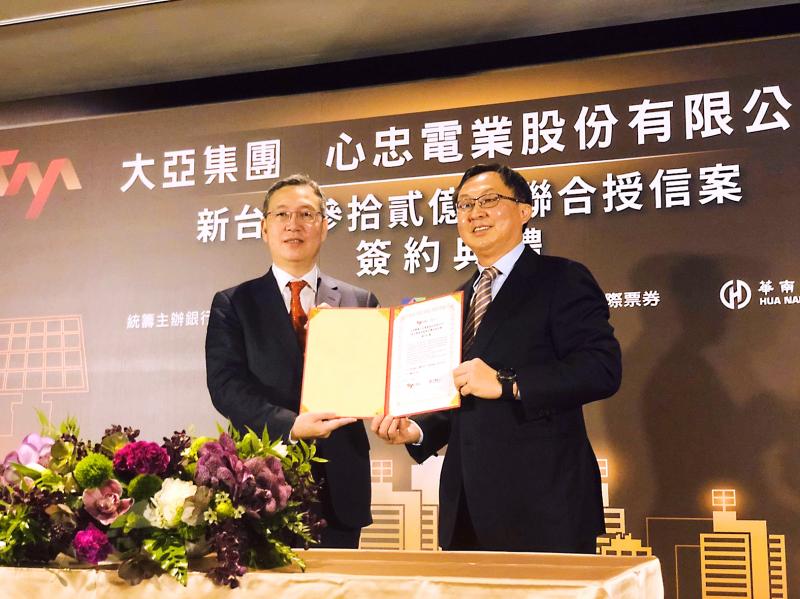Bank SinoPac (永豐銀行) and four other banks are providing Taya Group (大亞集團) with a NT$3.2 billion (US$106.31 million) syndicated loan to install 76 megawatts of ground-mounted solar power in Tainan, Bank SinoPac said yesterday.
Bank SinoPac is serving as the lead bank, with KGI Bank (凱基銀行), Hua Nan Commercial Bank (華南銀行), Chang Hwa Bank (彰化銀行) and International Bills Finance Corp (國際票券) also contributing to the loan, it said.
The banks did not disclose interest rates for the loan nor how it would be split among the five lenders, saying only that the syndicated loan was 153 percent oversubscribed.

Photo: Kelson Wang, Taipei Times
Interest rates for syndicated loans are usually lower than those for regular corporate lending, one bank manager said.
“We have been focusing on offering green loans since 2012, as it helps the nation acquire more clean energy,” Bank SinoPac president Eric Chuang (莊銘福) told a news conference in Taipei.
The loan marked its latest funding for solar power projects after it last year arranged NT$2 billion in syndicated loans for Formosa Solar Renewable Power Co Ltd (寶島陽光), NT$4 billion for Kingstone Energy Technology Co (國軒科技) and NT$6 billion for Chailease Finance Co Ltd (中租迪和), Chuang said.
The lender has made loans to more than 4,000 solar power farms with total installed capacity of 1 gigawatt as of the end of last month, he said, adding that the amount of outstanding loans totaled NT$27.4 billion.
Taya Electric Wire and Cable Co (大亞電線電纜 ) is to build a photovoltaic power station on a 70m2 plot in Tainan’s Xuejia District (學甲), chairman Ryan Shen (沈尚弘) said.
It is the nation’s first solar power project built on an integrated plot of private land that had different owners, Shen said, adding that the firm spent two-and-a-half years persuading the owners, who had used the land for raising fish, to rent it for solar power.
“Thankfully, there were only a few owners, so it was not too complicated. They agreed, as selling solar power would make more money than selling fish,” Shen said, adding that the company also had to apply to change the land’s zoning.
Taya is to finish the solar farm by the end of this year, which is expected to generate 1.8 billion units of electricity in the next 20 years, he said.
The company would sell the electricity to Taiwan Power Co (Taipower, 台電) under the state-owned company’s feed-in tariff (FIT) scheme, with total profit forecast to be at least NT$2.4 billion, Shen said.
“We did consider selling the power to private companies that need green energy, such as Apple Inc’s suppliers,” Shen said.
“However, as the FIT scheme promises a fixed price over the next 20 years, it can help us earn revenue without any price fluctuations, so we prefer selling to Taipower,” Shen said.
Private technology companies prefer onshore wind power, as the energy is much cheaper than ground-mounted solar power, with the prices for the two types at about NT$2 per unit and NT$4 per unit respectively, he said.

SEMICONDUCTORS: The German laser and plasma generator company will expand its local services as its specialized offerings support Taiwan’s semiconductor industries Trumpf SE + Co KG, a global leader in supplying laser technology and plasma generators used in chip production, is expanding its investments in Taiwan in an effort to deeply integrate into the global semiconductor supply chain in the pursuit of growth. The company, headquartered in Ditzingen, Germany, has invested significantly in a newly inaugurated regional technical center for plasma generators in Taoyuan, its latest expansion in Taiwan after being engaged in various industries for more than 25 years. The center, the first of its kind Trumpf built outside Germany, aims to serve customers from Taiwan, Japan, Southeast Asia and South Korea,

POWERING UP: PSUs for AI servers made up about 50% of Delta’s total server PSU revenue during the first three quarters of last year, the company said Power supply and electronic components maker Delta Electronics Inc (台達電) reported record-high revenue of NT$161.61 billion (US$5.11 billion) for last quarter and said it remains positive about this quarter. Last quarter’s figure was up 7.6 percent from the previous quarter and 41.51 percent higher than a year earlier, and largely in line with Yuanta Securities Investment Consulting Co’s (元大投顧) forecast of NT$160 billion. Delta’s annual revenue last year rose 31.76 percent year-on-year to NT$554.89 billion, also a record high for the company. Its strong performance reflected continued demand for high-performance power solutions and advanced liquid-cooling products used in artificial intelligence (AI) data centers,

Gasoline and diesel prices at domestic fuel stations are to fall NT$0.2 per liter this week, down for a second consecutive week, CPC Corp, Taiwan (台灣中油) and Formosa Petrochemical Corp (台塑石化) announced yesterday. Effective today, gasoline prices at CPC and Formosa stations are to drop to NT$26.4, NT$27.9 and NT$29.9 per liter for 92, 95 and 98-octane unleaded gasoline respectively, the companies said in separate statements. The price of premium diesel is to fall to NT$24.8 per liter at CPC stations and NT$24.6 at Formosa pumps, they said. The price adjustments came even as international crude oil prices rose last week, as traders

SIZE MATTERS: TSMC started phasing out 8-inch wafer production last year, while Samsung is more aggressively retiring 8-inch capacity, TrendForce said Chipmakers are expected to raise prices of 8-inch wafers by up to 20 percent this year on concern over supply constraints as major contract chipmakers Taiwan Semiconductor Manufacturing Co (TSMC, 台積電) and Samsung Electronics Co gradually retire less advanced wafer capacity, TrendForce Corp (集邦科技) said yesterday. It is the first significant across-the-board price hike since a global semiconductor correction in 2023, the Taipei-based market researcher said in a report. Global 8-inch wafer capacity slid 0.3 percent year-on-year last year, although 8-inch wafer prices still hovered at relatively stable levels throughout the year, TrendForce said. The downward trend is expected to continue this year,